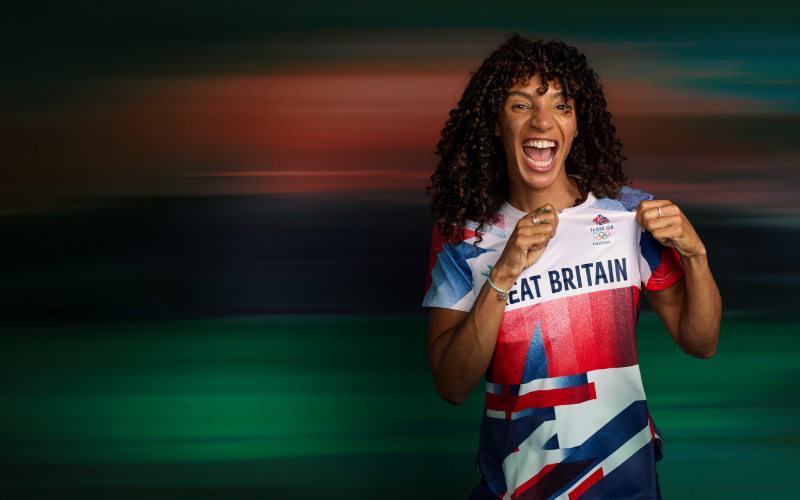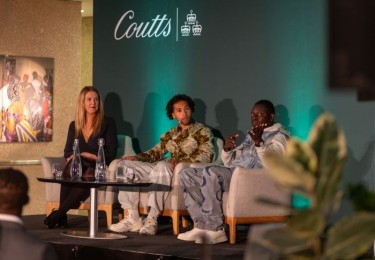Lifestyle | 17 October 2024
“When I put on that Team GB vest, I feel an immense self-pride and happiness” – Ashleigh Nelson on representation and Black History Month
The European Champion sprinter discusses the importance of celebrating inclusion and heritage on the running track and what Black History Month means to her.
Having run for Great Britain at three Olympic Games, and delivered famous relay victories as a European Champion and gold medallist for England at the Commonwealth Games, Ashleigh Nelson easily fits the definition of a role model.
That comes with a degree of extra pride, she says, given her background and the narratives she wants to tell for the next generation.
“Having the heritage that I do, I always want to first and foremost do my family proud, but also the community and the Black community,” she says. “I wanted to represent my heritage because, growing up in Stoke-on-Trent, I didn't always have the people or role models to look up to. And if I could be that for even one person, one little person that looks like me, then I'd be absolutely honoured.”

Celebrating the power of diversity
Black History Month gives time and space to reflect on narratives and experiences that may have been historically marginalised. Such reflections can celebrate the many personal journeys that make up an ongoing greater narrative, says Ashleigh.
“I think it's just a great opportunity to look back at the sacrifices that were made, the achievements that have already happened, but also the future achievements and opportunity we're trying to create for the Black community.”
Arguably, Ashleigh’s victories on the track have epitomised those achievements, not only through sporting prowess but also by wearing more than just a badge.
She says, “I do feel an immense, immense, level of pride when I get to represent not only Great Britain, but also my heritage. It can be really hard to describe because they're both as important as each other to me. When I get to put on that Team GB vest and go out in front of thousands and thousands of people, I feel an immense self-pride and happiness.”
However, Ashleigh is also upfront about the additional pressure she has felt as a Black athlete, identifying the unjustifiable scrutiny herself and her colleagues have been subjected too when things don’t go to plan.
“All of a sudden, even though you’re wearing a GB vest, I feel like it's your skin colour that's probably highlighted more,” she says. “And then the people that were supporting you ten seconds ago can also be your biggest critics. It's at times like that that I really do just wish it wasn't the way it is at times.”
Breaking barriers
However, the 100m specialist’s own experience has shown how success through inclusion excludes base prejudices while empowering communities – and delivering medals.
“Being in teams where diversity and different backgrounds are celebrated – it definitely brings a team spirit,” says Ashleigh. “It is this that brings everybody together and nobody cares what you look like or where you're from. When you're part of Team GB, even if you don't know the other person who's come and sat on the table with you, you'll speak to them no matter the background because, when we put this on, we're one.
“I've definitely seen that change over the years as the teams have become more diverse and different people are coming into the setup, not only athletes, but also staff.”
That result has been consistent finishes at the business end of the medal tables and, equally valuable, a winning ecology that engages and inspires all elements of the team and the society they represent.
That’s something that goes right back to the importance of role models, explains Ashleigh.
She says, “It’s important to see people that look like you in power and positions of power, especially when you need help. It’s important to be comfortable. When you're working in fine margins like sprinting, that could be the difference between getting a medal and not getting a medal.
“So, yes, Team GB have definitely, definitely, done a great job through integration, diversity and inclusion.”
Perhaps the biggest learning, says Ashleigh, is how those tenets of inclusion transcend sport to be valid to success and diversity in all walks of life.
She says, “Putting people in leadership roles that are a representation of the community that they're working with and making sure that everybody's voice is heard, and just creating an environment for everybody to flourish no matter your background, no matter your race, no matter your sex is crucial.
“Just having that diversity, and creating space is invaluable.”
More insights






